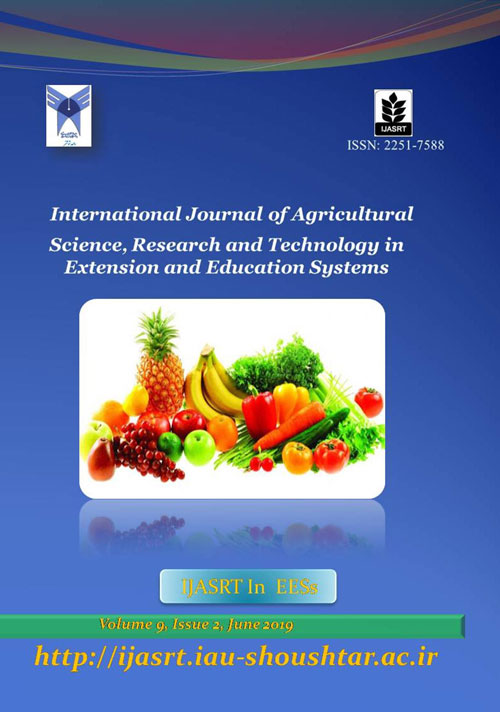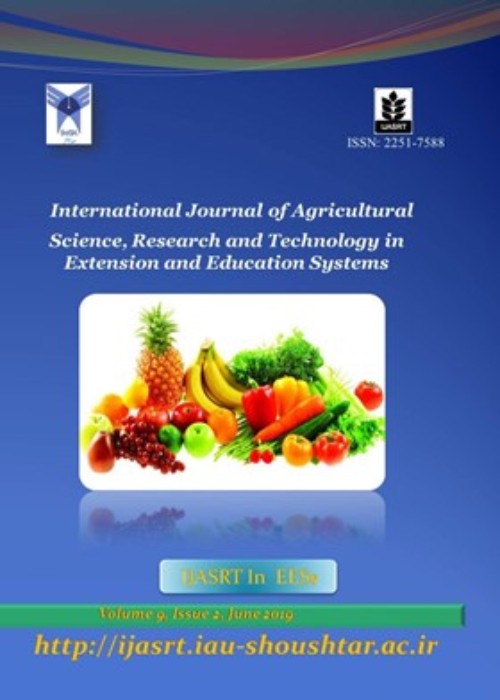فهرست مطالب

International Journal of Agricultural Science Research and Technology in Extension and Education Systems
Volume:4 Issue: 2, Jul 2014
- تاریخ انتشار: 1393/04/10
- تعداد عناوین: 8
-
Pages 61-76
Soil erosion is one of the most important forms of land degradation that threatens continued and sustained agricultural production in Ghana. The most severely affected areas are the three northern regions especially Upper East Region, where large tracts of land have been destroyed by water erosion leading to soil depth reduction and decline in soil fertility. This study was carried out in Talensi Nabdam District of Upper East Region of Ghana to examine the adoption of soil conservation technologies of rural farmers in the district. A random sample of 350 household was selected from seven communities in the district. Questionnaires administered in the area provided primary data needed for analysis. Descriptive statistics were employed in describing the socio-economic characteristic of farmers. Mean was used to rank the constraints and perception indices were used to analyze for the perception of farmers on the various soil conservation technologies. Probit model was used in the analysis of factors that influenced farmer’s decision to adopt soil conservation technologies and among the eight variables fitted in the model, four were found to be significant for stonebunds, three for earthbunds, three for vertiver grass and three for manure. Farmer based organization, household size; extension contact and labour were significant for stonebunds. Education, household size and labour were significant for earthbunds. Gender, household size and extension contact were significant for vertiver grass. Gender, household size and extension contact were significant for manure. Age, marital status and credit have no significant effects on farmers adopting all the conservation technologies.
Keywords: soil erosion, Soil conservation technologies, Land degradation -
Pages 69-74
The study assessed the entrepreneurial behaviour of smallholder cassava farmers in Ebonyi State, Nigeria. Multistage sampling technique was employed in the selection of 108 cassava farmers across the agricultural zones in Ebonyi state using pretested and structured questionnaire from which data and information were elicited. Analytically, the study employed entrepreneurial behavioural index (EBI) in the assessment of entrepreneurial behaviour of the cassava farmers. The result showed that the overall entrepreneurial behaviour of the cassava farmers posted a mean value of 0.4529 on a range of 0.17 – 0.70. This implies that their minimum entrepreneurial behaviour indicates gross underutilization of entrepreneurial attributes by the farmers while the maximum shows reasonable utilization of entrepreneurial capacity. The study concluded that aggressive agricultural transformation to enhance food security in Nigeria is feasible with effective management of human as well as material resources by promoting entrepreneurial behaviour of farmers. The study therefore recommends amongst others that government at all levels needs to deepen its educational and policy support to farmers through total overhauling of activities/programmes to activate their creativity.
Keywords: entrepreneurial behavior, Cassava farmers, Ebonyi State, Nigeria -
Pages 75-81
The place of information in addressing market access and participation limitation, which hinders farmer’s welfare and poverty reduction efforts in many developing countries, cannot be over-emphasized. This study therefore examined the use of mobile phone in the marketing of food crops among farming households in rural south east, Nigeria. A multi stage sampling procedures was used in the selection of location and 180 farming households sampled for this study, from which data were collected. The data were analyzed using probit regression model and Z – statistic procedure. Result of the analysis showed that knowledge of the GSM technology, quantity of crops produced, farm size, perceived need for information, distance to markets and income were major determinants of mobile phone use among the respondents. The result of the Z-test statistics also showed that among the selected socio-economic characteristics, educational attainment and age of the respondents had significant differences between users and non-users of mobile phones. The study calls for enlightenment campaign in order to sensitize the rural people on the importance of GSM technology in the transaction of their businesses, improvement in the services provided by the mobile phone service centers/ providers among other things.
Keywords: Food Crop, GSM mobile phones, Marketing, probit -
Pages 83-91Agriculture is the backbone of India’s economy as two-third of the population live in rural areas and directly or indirectly depend on agriculture for their livelihood. India’s food production has improved significantly during the last three decades due to all-round efforts but Indian agriculture is still facing a multitude of problems to maximize productivity to feed the continuously increasing population. Access to information and improved communication is a prerequisite for sustainable agricultural development. The use of information and communication technology (ICT) is an important pillar of agriculture extension and different sources and channels of agriculture information can play important role to meet the requirement. The use of modern information technology needs to be promoted for communication among scientists, extension workers and farmers to transfer the information and new technologies in a cost effective manner. An increased access to the scientific knowledge and information through information technology will help people specially the rural communities in making informed decisions and solving their problems by applying scientific methods. The present paper deals with the constraints and work out strategy for making information and communication technology effective for farmers. Information and communication technology is the backbone of modern development in almost all the sectors which can enhance agricultural and rural development by the transformation of the rural communities. Hence efforts should be made for increased and improved investment in ICT infrastructure and capacity development through the proper implementation of ICT policy.Keywords: agriculture, Dissemination, farmers, Information, communication technology (ICT)
-
Pages 93-97
The study sought to explore approaches for co-creation of conservation agriculture (CA) knowledge amongst farmers, nongovernmental organizations (NGOs), government and specialist researchers. The aim of the study was to explore farmer initiated food security strategies among small holder resource poor farmers, through enhancement of farmers’ own productive capacity. The study was born out of the limitations observed in the prescriptive linear extension models that failed during the green revolution in Africa. Five sites were purposively selected to explore farmer initiated CA modeled on action research approach. Action research is flexible, adaptable, cyclical allow for immediate application of findings, emancipatory, builds confidence and is collaborative. Results showed that farmers are socialized to believe that innovations only come from experts, and as a result do not believe that they can solve their own farming problems from own initiated innovations that is, ResearchExtensionFarmer. For a sustainable food security, the study recommends that CA innovations should align with the farmer mental model built on existing norms and values that people are grounded in, i.e. Co-creation of knowledge and not transferring of information from specialists. Farmers ought to rebrand specialist researchers in order to create meaningful, sustainable and relevant wealth.
Keywords: Conservation agriculture, action research, Extension -
Pages 99-104
The purpose of this research was studying relationship between socio- cultural, economical and managerial factors with the participation rate of agricultural cooperative's members in the Shirvan Chardavol township in the Ilam province, Iran. The method of this study is descriptive-correlative. A researcher made questionnaire was used as the tool for gathering data. The face and content validity of the questionnaire were confirmed by university professors and cooperatives experts. Also the reliability of the questionnaire was confirmed through calculating the Cornbach’s coefficient (α = 0.80). Population of this study included 751 active members of Shirvan-Chardavol county agricultural cooperatives. 260 people were selected as the sample based on using Morghan table. The classified proportional random sampling method was used in this study. Data processing was performed using SPSS estatistial software, as well as descriptive estatistics (central and inferential indexes) and analytical statistices (correlation coefficients analysis). The correlation coefficient results showed that there was significant relationship between socio- cultural, economical and managerial factors with level of participation of agricultural cooperatives members.
Keywords: Cooperative, participation, Socio- cultural, Economical, Managerial factors -
Pages 105-114
Rain-water-harvesting is one of the means by which agricultural production can be increased to meet the growing food demands in all regions. The study indentified the factor affecting rain-water-harvesting technology adoption for irrigation and farmers practice in water harvesting against drought in lowland woreda, Eastern Hararghe, Oromia Region. Both primary and secondary data were collected for the study. Primary data were collected from 190 sample households using questionnaire prepared during june15-july20/2014. The study implemented logistic regression model to identify factor affecting rain water harvesting adoption. Logistic regression estimation revealed that age of household head, education level, number of livestock in TLU, size of land holding, distance between home and farmers extension center and labor force the member are significantly affected the rain water harvesting adoption decision of household in study area. The results also show that on average rain water harvesting adopter households and non-adopter households had around 5043 and 2962 ETB respectively. This means, households that adopted rain-water-harvesting ponds were better off in total farm income compared to non-adopter households.
Keywords: Rain-water-harvesting, Logistic regression, Framers’ practice -
Pages 115-121
The purpose of the study was to examine compliance of extension personnel in Imo state agricultural extension service delivery system of Nigeria. A purposive and multi-stage random sampling was used to select 105 extension personnel from the three agricultural zones of the state. Data generated were analyzed using descriptive statistics such as frequencies and percentages, as well as mean score and correlation analysis. Results showed that the extension personnel in the state had a favourable and clear perception of relevance of ICTs for extension service delivery but only used radios, televisions, mobile phones and short message service (SMS) frequently. Generally, they were not able to use computer-based ICTs to perform extension tasks. Results showed that level of education, work experience and income had positive relationship at 5% level of significance with the number of ICTs the extension personnel had access to. ICT training should be built into the regular or periodic training programmes of extension personnel to make them ICTs compliant for improved agricultural productivity and to keep abreast of the current global trend.
Keywords: Information communication technologies, Compliance, Extension personnel


